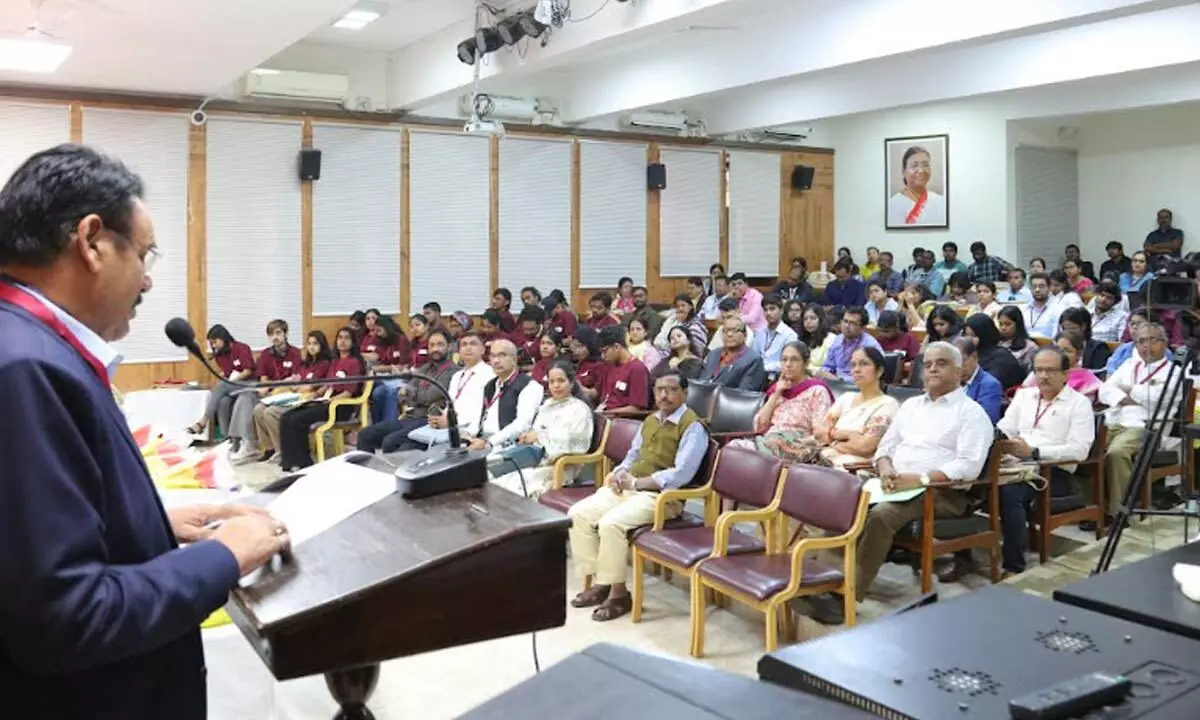Live
- Game Changer and Daku Maharaj: AP High Court Imposes Ticket Price Limits
- Theekshana becomes seventh Sri Lanka bowler to claim hat-trick in ODI
- Andhra Pradesh: No First-Year Exams from 2025
- Nara Lokesh Declares State's Ambition to Become a Global Digital Technology Hub
- Wanaparthy collector directs to provide security at EVM warehouse
- Ram Charan: Why the Hate? House Searches, Viral Tweets & More Before Game Changer Release
- Tamil Nadu CM Requests to Reschedule UGC-NET Exams During Pongal Festival
- K’taka BJP slams Cong govt over facilitating surrender of Maoists
- Watch: Teaser of Yash’s Upcoming Film ‘Toxic’, Full Trailer Coming Soon
- Six Naxals Set to Surrender at Karnataka CM’s Office
Just In
International Seminar held on AI, Educational Communication at EFLU


Prof. Sundeep R. Muppidi, Professor of Digital Media and Journalism in the School of Communication at the University of Hartford in Connecticut, USA stated that educators have the most important responsibility in fostering future generations of learners with critical thinking ability and digital literacy to harness the damaging impact of generative Artificial Intelligence (AI).
Hyderabad: Prof. Sundeep R. Muppidi, Professor of Digital Media and Journalism in the School of Communication at the University of Hartford in Connecticut, USA stated that educators have the most important responsibility in fostering future generations of learners with critical thinking ability and digital literacy to harness the damaging impact of generative Artificial Intelligence (AI).
Prof. Muppidi was speaking during the course of his Keynote address at International Seminar on Artificial Intelligence, Educational Communication, and Media Transformations organised at the English and Foreign Languages University (EFLU), Hyderabad on Thursday. Prof. Muppidi warned about the dangers of profiling of human identity by machines and the commodification of data by tech companies. Human reliance on future predictive AI models for decision-making may be laid with biased outputs claimed Prof. Muppidi. He lamented about the erosion of originality and critical thinking due to technology and stressed the importance of the synergy between human intelligence and AI in the future of education. He further urged educators to develop new pedagogical approaches to develop critical thinking ability in students, empowering future generations with the tools to harness the ethical challenges posed by AI.
Prof. J. B Nadda, Director, Consortium of Educational Communication (CEC), New Delhi in his inaugural address stated that AI has sparked a revolution in traditional models of education, personalised learning, fostered inclusiveness and democratised learning. He asserted the Consortium of Educational Communication (CEC) is a pioneer in educational technology and is committed towards holistic education through its vast network of EMRC centres and MOOCS platforms.
Speaking on the occasion, Prof. Haribandi Lakshmi, Vice Chancellor (In-Charge) of the English and Foreign Languages University,emphasised about AI’s potential pitfalls, and advocated for the inclusion of marginalized voices. She stressed that human translation remains irreplaceable by AI and called for embedding ethics into AI while safeguarding privacy and data security.
Prof. K. Narasimha Rao, Registrar of the University (In-Charge) linked AI tools to ancient religious texts, citing examples from the Ramayana and the use of algorithms by media houses to create rich content. He proposed introducing Automated Journalism and Computational Journalism courses at HEIs.
Dean Academics Prof. T. Samson spoke about the transformative impact of digital technologies, asserting that AI is radically redefining human existence and advocating for special interest groups on digital technologies.
The three day long conference organised by the Educational Multimedia Research Centre (EMRC), in collaboration with the Consortium for Educational Communication (CEC), New Delhi, and the Department of Communication at The English and Foreign Languages University (EFLU),Hyderabad, from November 28-30, 2024. The conference will include 12 panels comprising 60 research papers to deliberate the transformative impacts of AI and digital advancements on education and communication. This seminar provides a global forum for scholars, educators, practitioners, and innovators to delve into the intersections of AI, educational communication, and media, exploring how these technologies are reshaping educational practices, societal interactions, and public discourse.
Also present on the occasion was Prof. K. Satish Kumar Poduval, Dean School of Interdisciplinary Studies, Coordinator of the Seminar Prof. T.T Sreekumar who is also the Director of EMRC (I/c) and Prof. Nagamallika Gudipaty, Head department of Communication. Ph.D Scholars and Students from the department of Communication participated in the conference.

© 2024 Hyderabad Media House Limited/The Hans India. All rights reserved. Powered by hocalwire.com






